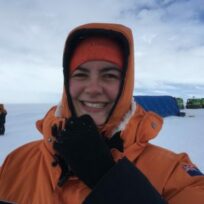
Title: ‘Where ocean meets ice: observing Antarctic grounding zone dynamics from space’
Abstract:
A recent headline in Nature Climate Change stated that “Observations of grounding zones are the missing key to understand ice melt in Antarctica” (Rignot, 2023).
The recent ice loss from Antarctica has been driven by the ocean-induced melt of its fringing ice shelves, which has reduced their ability to resist the oceanward flow of ice (aka “buttressing”). A significant obstacle to accurate projections of ice loss is the incomplete representation of critical processes affecting buttressing, particularly those acting in the grounding zone (GZ). The GZ marks the transition between fully grounded and freely floating ice. It typically experiences high basal melting and migrates inland as an ice shelf thins. Accurate representation of GZ processes requires measurements that resolve 3D topography of associated surface features, and also capture the impact of atmospheric and oceanic influences that exhibit significant variations on hourly to decadal time-scales. However, observations have been under-resolved in both space and time.
In this talk I will discuss the recent advances in satellite remote sensing of Antarctic ice shelf and grounding zone dynamics, focusing on two case studies. First, I will discuss a new method we have developed using ICESat-2 laser altimetry to measure how grounding lines migrate across the tide cycle. At an ice plain on the Ronne Ice Shelf we observed 15 km of tidal grounding line migration, the largest reported distance in Antarctica, dominating any signal of long-term migration. We identify four distinct migration modes, which provide both observational support for models of tidal ice flexure and GL migration and insights into ice shelf–ocean–subglacial interactions in grounding zones. Second, I will present recent observations of significant grounding line retreat on the Siple Coast linked to the upstream drainage of a subglacial lake. These results provide a rare window into the subglacial environment, in particular the interaction between subglacial hydrology and grounding zone dynamics, for which currently remarkably little is known.
Zoom Link: https://gatech.zoom.us/j/95963290955
Recording: Zoom Recording